:max_bytes(150000):strip_icc():format(webp)/camera-56e0976d3df78c5ba0566b37.jpg)
In 2024, 7 Ways to Lock Apps on Apple iPhone 14 and iPad Securely

7 Ways to Lock Apps on Apple iPhone 14 and iPad Securely
Are you concerned about your privacy and would like to secure certain apps on your iOS device? Don’t worry! There are plenty of ways to app lock the Apple iPhone 14 and protect your privacy. You can follow the same drill to restrict the usage of certain apps for your kids as well by taking the assistance of the Apple iPhone 14 app lock feature. The app lock for iPhone and iPad options can be used pretty easily. There are plenty of native and third-party solutions out there that you can use. In this post, we will make you familiar with seven different techniques on how to lock apps on iPhones and iPads.
Part 1: How to Lock Apps on iPhone with Screen Time?
Utilizing Screen Time on your Apple iPhone 14 offers a versatile way to manage app access. It is done through time restrictions and a dedicated passcode. By implementing Screen Time settings, you can exercise control over app usage. It ensures added security and regulated access to your preferred applications. Now, let’s walk through the steps to learn how to lock apps on iPhone Screen Time:
Step 1. Begin by accessing the Settings on your iOS device and tapping on the “Screen Time” option. On the ensuing screen, tap “App Limits,” followed by “Add Limit.”
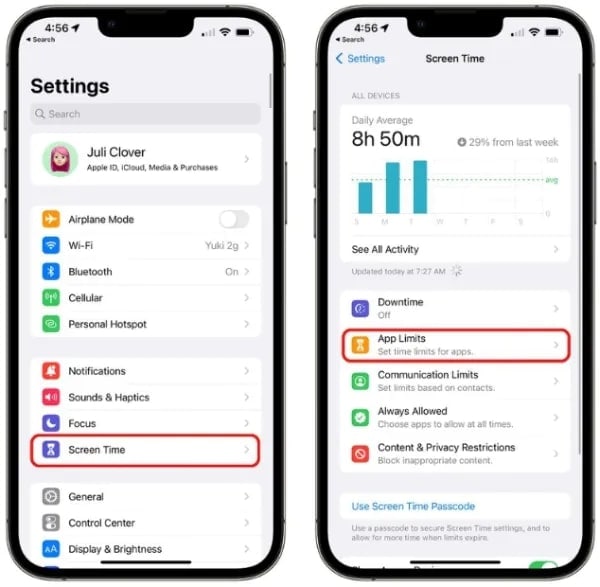
Step 2. Select the apps or categories of the apps, tap “Next,” and choose the “Time Limit” for the selected apps. After deciding the time limit, press “Add” from the top right corner to add an app limitation.
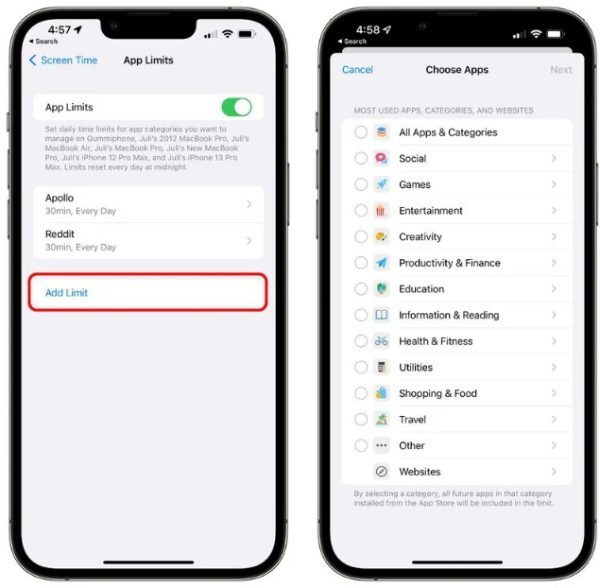
Part 2: How to Lock Apps on iPhone with Face ID & Passcode?
Leveraging the advanced security capabilities of Face ID or Passcode on your Apple iPhone 14 X or later models effectively fortifies app access. By using facial recognition or passcodes, you can put in place an extra layer of protection. It can be done for specific apps, safeguarding your sensitive data from unauthorized access. Now, let’s proceed with the detailed steps to lock apps using Face ID or Passcode on your iOS device:
Step 1. After opening the Settings app on your Apple iPhone 14, scroll down to access “Face ID & Passcode.” Here, you will be required to provide the passcode of your device.
Step 2. After providing the passcode, select “Other Apps” and check the apps that have Face ID enabled. Remember, you’re unable to manually include apps in the list. Only those apps that have sought access to the feature will appear here automatically.

Part 3: How to Lock Apps on iPhone Using Shortcuts?
If you are unable to lock the targeted app directly with Face ID, there is no need to worry. There exist workarounds that you can use, and one of them is using the Shortcuts app. It won’t directly lock apps with the Face ID. Instead, it provides a workaround by creating a shortcut that redirects to the lock screen.
When activated, it takes you to the lock screen, prompting Face ID, Touch ID, or Passcode to access the Apple iPhone 14 device again. Use the following steps to lock your apps using the Shortcuts app:
Step 1. On your Apple iPhone 14, launch the Shortcuts app and select the “Automation” tab from the bottom toolbar. There, tap “New Automation” and use the search bar to look for and select “App.”

Step 2. Now, tap “Choose” in front of the “App” and select the app you want to lock. Now, move down and select “Is Opened,” then move further down to choose “Run Immediately.” Here, leave “Notify when Run” deactivated.

Step 3. Proceed forward by tapping “Next” from the top right corner, and on the following screen, tap “New Blank Automation.” Then, press “Add Action” and enter “Lock Screen” into the Search field, then choose “Lock Screen” from the search results.

Step 4. Finally, tap “Done” to finalize the shortcut. Now, upon accessing the targeted app, the shortcut will activate in the background, causing your Apple iPhone 14 to be locked. You can then use the Face ID, Touch ID, or passcode to unlock it.

Part 4: How to Lock Apps on iPhone Using Restrictions?
By taking the assistance of Apple’s native Restrictions feature, you can app lock the Apple iPhone 14 without any trouble. In this way, you can set up a passcode that needs to be matched before accessing any app. This iPhone app lock is also a great way to restrict your kids from accessing certain apps or making purchases. To learn how to lock apps on iPhone or iPad using Restrictions, follow these steps:
Step 1. Unlock your device and go to its Settings > General > Restrictions.

Step 2. Turn the feature on and set up a passcode for app restrictions. To provide added security, you can set up a passcode that is not similar to your lock screen passcode.
Step 3. Now, you can set up an app lock for iPhone using Restrictions. Simply go to General > Restrictions and turn this feature on for any app of your choice.
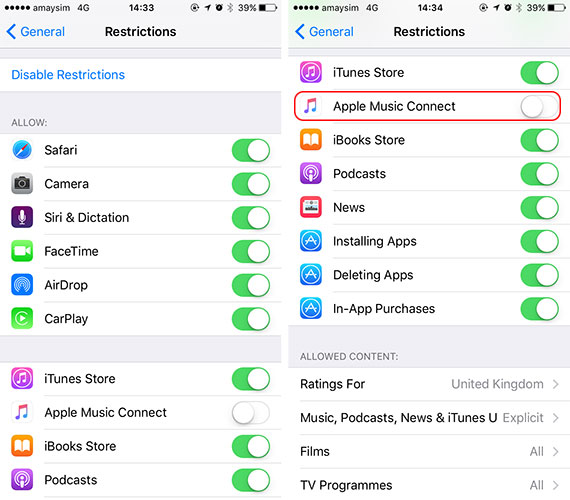
Step 4. If you want, then you can also switch this feature off for any app using the same method.
Bonus Tip: How to Unlock iPhone withoutScreen Locks (PIN/pattern/fingerprints/face)
It can be a trouble if you forget your Apple iPhone 14 passcode since there are many restrictions on using iPhone. Also, if you are still unable to verify your Apple ID by using the above ways you may consider removing your Apple ID on your iOS devices. Here is an easy way to help you bypass Apple ID without a password and 100% working, which is to use Dr.Fone - Screen Unlock (iOS). It’s a professional iOS unlocker tool that can help you remove various locks on iPhones and iPads. With only a few steps, you can easily remove your Apple ID.
Dr.Fone - Screen Unlock (iOS)
Remove iPhone iPhone-locked screen without Hassle.
- Unlock an iPhone whenever the passcode is forgotten.
- Save your Apple iPhone 14 quickly from the disabled state.
- Free your sim out of any carrier worldwide.
- Works for all models of iPhone, iPad, and iPod touch.
- Fully compatible with the latest iOS.

4,008,670 people have downloaded it
Part 5: How to Lock Apps on iPhone Using Guided Access?
Besides the Restrictions feature, you can also take the assistance of Guided Access to lock a certain app on your device. It was originally introduced in iOS 6 and can be used to restrict your device temporarily with the usage of a single app. It is mostly used by parents who would like to restrict their kids from using a single app while lending their devices. Teachers and people with special needs also use Guided Access pretty frequently. To learn how to lock apps on iPhone using Guided Access, follow these steps:
Step 1. To start with, go to your device’s Settings > General > Accessibility and tap on the “Guided Access” option.

Step 2. Turn on the “Guided Access” feature and tap on the “Passcode Settings”.

Step 3. After selecting the “Set Guided Access Passcode” option, you can set up a passcode to use it as an app lock for iPhone.
Step 4. Now, simply launch the app that you want to restrict and tap the Home button three times. This will start the Guided Access mode.

Step 5. Your phone would now be restricted to this app. You can further restrict the usage of certain app features as well.
Step 6. To exit the Guided Access mode, tap the Home screen three times and provide the respective passcode.

Part 6: How to Lock Apps on iPhone with Touch ID?
On the Apple iPhone 14 8 Series and iPhone SE, Apple offers Touch ID for security. In the process, it is similar to the Face ID available on the later iPhones. If you have an iOS device with Touch ID, here are the steps you can follow for the app lock iPhone process:
Instructions: To start, open the Settings application. Now scroll down to locate and select the “Touch ID & Passcode” option. On the following screen, you can deactivate or activate Touch ID for apps.

Part 7: How to Lock Apps on iPhone Using Third-Party Apps?
1. Lock Apps onApple iPhone 14 & iPad via Famisafe
If the reason you want to lock the apps on your Apple iPhone 14 has to do with managing your kid’s phone usage, we have an excellent alternative for you. FamiSafe is a reliable parental control app that offers features to monitor and manage a child’s device usage. It focuses on parental controls, including features like screen time management, location tracking, web filtering, and activity monitoring.
It offers robust controls to restrict overall device usage, set screen time limits, and monitor app usage. This helps parents guide and regulate their children’s activities on iOS devices. You can use the following steps to lock apps using FamiSafe:
Step 1: Install FamiSafe and FamiSafe Jr on Respective Devices
Get FamiSafe from the App Store and log in using your Wondershare ID or your Apple, Google, or Facebook account. Select the parent mode and link your child’s phone by installing FamiSafe Jr on their devices using either the QR code or the pairing code. Once the pairing is done, input details about your children and allow FamiSafe Jr to oversee their devices.

Step 2: Provide the Necessary Permissions to FamiSafe
Now, activate Accessibility for FamiSafe by accessing “Settings,” tapping “FamiSafe,” and enabling “Location.” Then, grant access to the Apple iPhone 14 device’s photos, microphone, and motion & fitness activity. Now, use a computer and connect your child’s device with a USB cable. Activate content blockers in Safari to prevent kids from accessing inappropriate content.

Step 3: Connect the Kid’s Device to the Computer
To do that, access “Safari” in “Settings” and move to”Content Blockers” to enable FamiSafe. To get started, connect your kids’ iOS devices to your PC. Once connected, navigate to the main interface and select “Features” located at the bottom. This will display available features, and you can proceed by tapping on “App Blocker.”

Step 4: Block Any App Using the App Blocker Feature
Establish the connection between your kids’ iOS devices and your PC by pairing them with your phone. From there, effortlessly choose and block any unwanted apps on your kids’ phones. Additionally, you have the option to block apps based on their App Store ratings for added control and security.

2. Lock apps onApple iPhone 14 & iPad using App Locker
Besides the native iPhone app lock solutions, you can also take the assistance of a third-party tool. However, most of these apps only support jailbroken devices. Therefore, if you wish to use a dedicated app lock for your Apple iPhone 14, then you need to jailbreak your device. Needless to say, getting your device jailbroken has its perks and demerits. If you don’t want to jailbreak your device, then you can simply take the assistance of the above-mentioned solutions.
However, if you have a jailbroken device and would like to app lock the iPhone, then you can also use AppLocker. It is available at Cydia’s repository and can be purchased for just $0.99. It can be installed on your jailbroken device to get an added level of security. Not just apps, it can also be used to lock certain settings, folders, accessibilities, and more. To learn how to lock apps on iPhone using AppLocker, follow these steps:
Step 1. Firstly, get AppLocker on your device from http://www.cydiasources.net/applocker . As of now, it works on iOS 6 to 10 versions.
Step 2. After installing the tweak, you can go to Settings > Applocker to access it.

Step 3. To access the feature, make sure that you have “Enabled” it (by turning it on).
Step 4. This will let you set up a passcode to lock the apps and settings of your choice.
Step 5. To app lock, the iPhone, visit the “Application Locking” feature on your device.
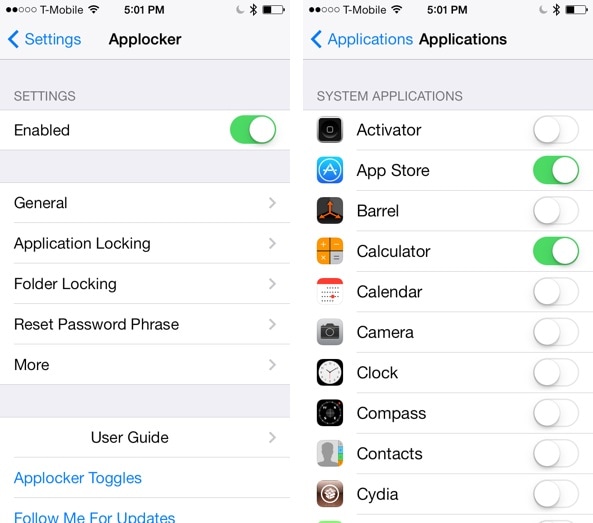
Step 6. From here, you can turn on (or off) the locking feature for apps of your choice.
This will let your app lock the Apple iPhone 14 without any trouble. You can also go to the “Reset Password Phrase” to change the passcode.
3. Lock Apps onApple iPhone 14 & iPad using BioProtect
Just like Applocker, BioProtect is another third-party tool that works only on jailbroken devices. It can also be downloaded from Cydia’s repository. Apart from apps, you can also use BioProtect to lock settings, SIM features, folders, and more. It is linked to the Touch ID of the Apple iPhone 14 device and scans the fingerprint of a user to grant (or deny) access to any app. The app only works on iPhone 5s and later devices, having a Touch ID. However, you can also set a passcode as well if your Touch ID is not working. To use the BioProtect app lock for iPhone, follow these steps:
Step 1. Firstly, get the BioProtect app to lock iPhone on your device from the right http://cydia.saurik.com/package/net.limneos.bioprotect/ .
Step 2. To access the tweak’s panel, you need to provide your fingerprint access.
Step 3. Place your finger on your Touch ID and match its print.

Step 4. This will let you access the BioProtect app settings.
Step 5. Firstly, enable the app by turning the respective feature on.
Step 6. Under the “Protected Applications” section, you can see a list of all the major apps.

Step 7. Simply turn on (or off) the feature of the app that you wish to lock.
Step 8. You can also go to the “Touch ID” feature to further calibrate the app.
Step 9. After setting the lock, you would be asked to authenticate using your fingerprint to access the protected app.

Wrap it up
By following these solutions, you would be able to learn how to lock apps on the Apple iPhone 14 without much trouble. We have provided both, third-party as well as native solutions to app lock the Apple iPhone 14 in a secure manner. You can go with your preferred option and provide an added layer of security on your device to keep it safe.
Resolve Your Apple iPhone 14 Keeps Asking for Outlook Password
Individuals and organizations use a diverse range of mail platforms to exchange information. Gmail, Outlook, or any alternative service is consistently utilized. While email platforms have revolutionized communication, they aren’t present without their challenges. Users often encounter issues that range from sync errors to authentication problems.
Among these challenges, iPhone users specifically grapple with a persistent issue. It often appears as “iPhone keeps asking for Outlook password.” This issue disrupts the user experience and raises security concerns. To address this problem, this guide presents a detailed guide featuring effective fixes.

Part 1. Why Does My iPhone Keep Asking for Outlook Password
The iPhone asking for Outlook password arises from a combination of factors. Understanding these reasons is crucial in diagnosing and resolving the problem effectively:
1. Incorrect Password Entry
Users might unknowingly enter the wrong password. They may have changed their Outlook password without updating it on their iPhones. This mismatch can trigger continuous password prompts.
2. Outdated Mail App
An outdated Outlook mail app on your Apple iPhone 14 may struggle to communicate with its latest security protocols. This can lead to performance issues like the Apple iPhone 14 keeps asking for passwords.
3. Network Connectivity Issues
Upholding a stable internet connection is necessary for effortless communication. An unreliable or unstable network can disrupt the synchronization process in Outlook.
4. Corrupted Email Account Profile
A corrupted email account profile on the Apple iPhone 14 can cause disruptions during the authentication process. Resetting the email account on the Apple iPhone 14 device might be necessary to resolve the issue.
5. Third-Party App Interference
Other mail applications installed on the Apple iPhone 14 can also cause an issue. They might interfere with the Outlook app’s proper functioning. Identifying and temporarily disabling such apps can help diagnose and resolve the issue.
6. Excessive Email Fetching
Configuring the Outlook mail app to fetch emails too frequently causes the issue. It can strain the connection with Outlook servers, leading to authentication challenges. That causes issues like the Apple iPhone 14 asking for a password.
7. iOS Software Glitches
The smooth functioning of the Mail app may be disrupted by problems and malfunctions present in the iOS software. Compatibility issues could emerge if your device is not operating on the latest iOS version.
Part 2. [Fixes] Solve iPhone/iPad Keeps Asking for Outlook Password
Now that we have explored why the iPad keeps asking for an Outlook password, it is time for practical solutions. These 13 fixes discussed below are designed to address the root causes comprehensively:
Fix 1. Add Password Once and Let the Prompt Disappear
If your Apple iPhone 14 continuously prompts you for the Outlook password, a simple solution is to re-enter the password. Follow these steps to potentially resolve the issue once and for all by accessing the respective settings:
- Step 1. You begin by accessing your iDevice’s “Settings” app and scrolling down to tap the “Mail” option. Next, press “Accounts,” and on the following screen, select the Outlook account.

- Step 2. Encountering the error message “Account not authenticated” is what you will come across. Now, tap the “Re-enter Password” option to enter your correct Outlook password.

Fix 2. Change the Password to Your Outlook Mail
Sometimes, the email service provider may force users to change their passwords for security reasons. There is a chance that it is why your iPhone asks for an Outlook password. To modify your Outlook password from the desktop platform, adhere to the following steps:
- Step 1. Open your preferred web browser and go to the Outlook login page. Sign in to your Outlook account, locate, and click on your profile picture in the upper-right corner. There, click “My Profile,” and on the next screen, tap “Change Password” near the upper right corner.

- Step 2. Upon reaching the verification page, provide your password and tap the “Sign In” button. Afterward, you will be asked for other verification methods. Upon verifying, the “Change your password” window will appear. Here, you will need to enter your “Current password,” “New password,” and re-enter it to proceed. Then, hit the “Save” button, and your password will be changed.

Fix 3. Checking the Network Connection
Network inconsistencies can often disrupt the authentication process. This can be the leading cause behind persistent password prompts. To ensure a stable connection, ensure that you are connected to a reliable and stable Wi-Fi network. You can also try toggling the Wi-Fi and mobile data switches on and off.
Another way to confirm if network errors are the problem is to try enabling Airplane Mode. After a while, disable the Airplane Mode and check if the issue is resolved.

Fix 4. Using the Mail Toggle as a Remedy
A strategic approach to resolving authentication issues involves using the Mail toggle. You can use it to disable and re-enable the email services. This action essentially resets the Outlook app’s connection and can be performed as follows:
- Step 1. Within your Apple iPhone 14’s “Settings” app, scroll down and tap “Mail.” On the following screen, press “Accounts” and choose the “Outlook” account.

- Step 2. Here, you will find the toggle switch for “Mail.” Now, turn off the email service and wait for a few moments. Toggle the switch back on to re-enable the email service.

Fix 5. Delete and Re-Insert Outlook Account
Deleting and re-inserting your Outlook account on your Apple iPhone 14 can provide a fresh start to the email integration. Follow these steps if the persistent iPhone keeps asking for an Outlook password:
- Step 1. Navigate to the “Mail” tab within the “Settings” app on your Apple iPhone 14, and choose “Accounts” to observe the roster of email accounts. Here, tap on your Outlook account, and the following screen, press “Delete Account.”

- Step 2. Once you have deleted the account, return to the “Accounts” tab. Select “Outlook.com” after tapping on “Add Account.” Now, follow the on-screen instructions to re-enter your account details.

Fix 6. Re-Check Sync Settings
Ensuring that your sync settings align with Outlook’s recommended configurations is crucial. Follow these steps to re-check and adjust your sync settings on your Apple iPhone 14:
- Step 1. After accessing the “Mail” tab within the Settings app, tap “Accounts.” Here, find and choose the “Fetch New Data” option, followed by selecting the “Outlook” account.

- Step 2. Confirm that the “Push” or “Fetch” settings are configured to your preference. “Push” enables real-time updates, while “Fetch” allows you to set specific intervals for email updates.

Fix 7. Uninstall and Re-Install Outlook App
Is the Outlook app generally showing a lot of glitches on your Apple iPhone 14? If yes, uninstalling and then re-installing it can address potential “iPhone**/iPad keeps asking for Outlook password”** issues:
Instructions: On your Apple iPhone 14’s home screen, navigate to the Outlook mail app. Long-press the Outlook app icon and choose “Remove App” from the pop-up menu. Then, tap “Delete App” and follow it by pressing “Delete” to uninstall the app. Afterward, access the App Store and download the Microsoft Outlook app again.

Fix 8. Update iOS From Settings
Outdated iOS versions can contribute to compatibility issues and glitches. This can affect the proper functioning of the Mail app and its integration with Outlook. Follow these steps to ensure your iOS is up to date:
Instructions. Access your device’s “General” settings from the Settings app. Tap “Software Update” on the next screen and check if an update is available. Tap “Install Now” to kick-start the iOS updating process if an update is available. Make sure your device is adequately charged and maintains a stable internet connection.
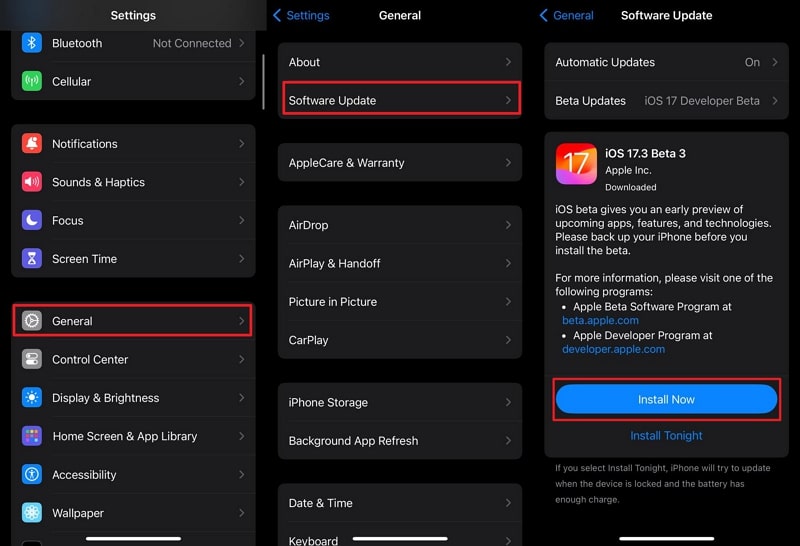
Fix 9. Try Other Alternatives to Outlook
Exploring alternative mail applications may offer a viable workaround. This is especially true if the iPhone asking for the Outlook password proves resistant to previous solutions. Consider using other email platforms such as Apple Mail, Gmail, and Yahoo Mail. This solution might not directly resolve the issue with Outlook. Yet, an alternative can provide a temporary workaround until a solution is found.
=

Fix 10. Try Disabling Privacy Protection
Certain privacy protection features on your Apple iPhone 14 may interfere with the integration of Outlook. To troubleshoot this, consider temporarily disabling privacy protection settings:
Instructions. On your Apple iPhone 14, access “Mail” settings through the Settings application. Now, scroll down to find and tap the “Privacy Protection” option in the “Messages” section. Next, you will come across the “Protect Mail Activity” switch. Here, toggle off the switch to check if it is resolved.

Fix 11. Reset All Settings of the iPhone
If the persistent password prompts remain unresolved, resetting all settings on your Apple iPhone 14 can be the solution. It acts as a comprehensive solution to potential configuration issues. This action does not erase your data but resets system settings to default. To reset all settings on your Apple iPhone 14, you can follow these steps:
- Step 1. Navigate to the “General” tab in the “Settings” app on your Apple iPhone 14 after you open it. Move down the screen, and at the bottom, choose “Transfer or Reset iPhone.”

- Step 2. On the following screen, tap “Reset” and select “Reset All Settings” from the available options. Enter your device passcode if prompted and confirm the action by selecting “Reset All Settings” again.

Fix 12. Add an Account by Switching to IMAP
In some cases, switching the account type to IMAP during the setup process can help resolve issues. For many users, it has worked to resolve issues related to Outlook password prompts. Follow these steps to add your Outlook account using the IMAP protocol:
- Step 1. Begin by accessing the “Settings” app on your Apple iPhone 14, then scroll down to locate and tap on “Mail.” Within this section, choose “Accounts” to display the roster of email accounts, and proceed to tap on “Add Account.”

- Step 2. Choose “Other” as the account type and select “Add Mail Account.” Enter your Name, full Outlook email address, descriptive description, and unique password, and hit “Next.”

- Step 3. Utilize the specified settings for the “Incoming Mail Server” and “Outgoing Mail Server” sections under the “IMAP” tab:
Incoming Mail Server
Hostname: imap-mail.outlook.com
Username: Your full Outlook email address
Password: Your Outlook password
Outgoing Mail Server
Hostname: smtp-mail.outlook.com
Username: Your full Outlook email address
Password: Your Outlook password
At last, hit the “Next” button at the top-right side of the screen.

Fix 13. Contact Support of Outlook To Resolve
If none of the previous fixes resolve the issue, seek help directly from Outlook Support. Outlook’s support is capable of addressing a broad spectrum of issues. It is adept at delivering personalized assistance tailored to your circumstances.
Bonus Part. Can’t Access Outlook Because iPhone Is Locked? A Quick Solution
The iPhone keeps asking for an Outlook password, which isn’t the only password-related problem. Forgetting the screen locks of their iPhones is a common phenomenon. It is especially prevalent among iPhone users. You can no longer access important Outlook emails when your Apple iPhone 14 is locked. That is where Wondershare Dr.Fone emerges as your savior. This powerful tool can bypass all types of iOS screen locks within minutes.
It can remove lock screens on your Apple iPhone 14, iPad, and iPod. You can say goodbye to the hassle of dealing with iCloud activation locks. Moreover, it helps remove your Apple ID if you have forgotten your Apple ID password. Dr.Fone allows you to bypass them effortlessly without requiring a password.
Prime Features of Wondershare Dr.Fone
- It can circumvent Mobile Device Management and screen time restrictions without data loss.
- This tool completely supports the most recent iOS 17, iPadOS 17, and iPhone 15.
- Additionally, this software effortlessly bypasses carrier locks on your Apple iPhone 14.
Steps To Unlock Your Apple iPhone 14 via Wondershare Dr.Fone
Unlocking your Apple iPhone 14 using Wondershare Dr.Fone is a straightforward process. That is made possible with its intuitive interface and a simple 3-step procedure. You can use the following steps to bypass your Apple iPhone 14’s screen lock within minutes:
- Step 1: Access Screen Unlock by Launching Dr.Fone
Once you’ve launched Dr.Fone on your computer, go to Toolbox. Here, tap “Screen Unlock” and choose “iOS.” In the opened window, choose the “Unlock iOS Screen” option to unlock your iOS device’s screen. On the subsequent screen, click “Start” to commence the iOS device unlocking process.
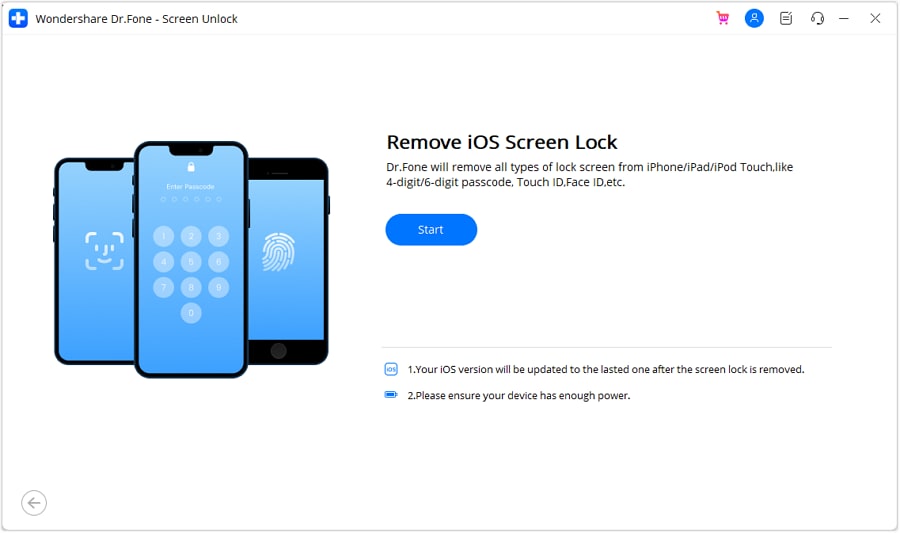
- Step 2: Initiating iPhone Recovery Mode and Device Identification
Subsequently, you need to place your Apple iPhone 14 into Recovery Mode. Adhere to the on-screen instructions corresponding to the model of your iDevice. Afterward, the tool will automatically detect the “Device Model.” If necessary, adjust the model and choose the “System Version.” Once these steps are completed, click “Start” to initiate the unlocking process.
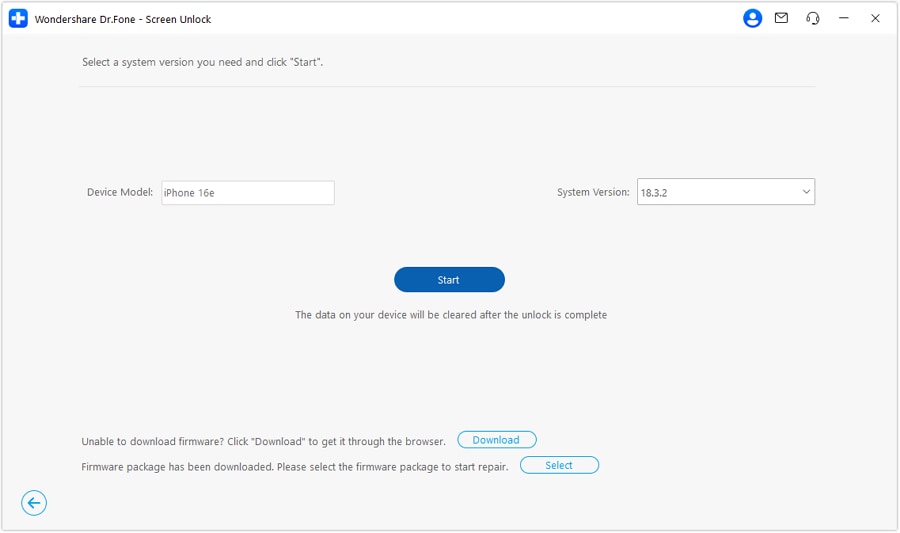
- Step 3: Finalizing iOS Device Unlock
Monitor the iOS firmware download progress on the screen. After successful download and verification, proceed by selecting “Unlock Now.” A confirmation window will appear, prompting you to input the necessary code. Enter the code and tap Unlock to proceed to the outcome. Upon unlocking the iDevice, click the “Done” button to finalize the process.
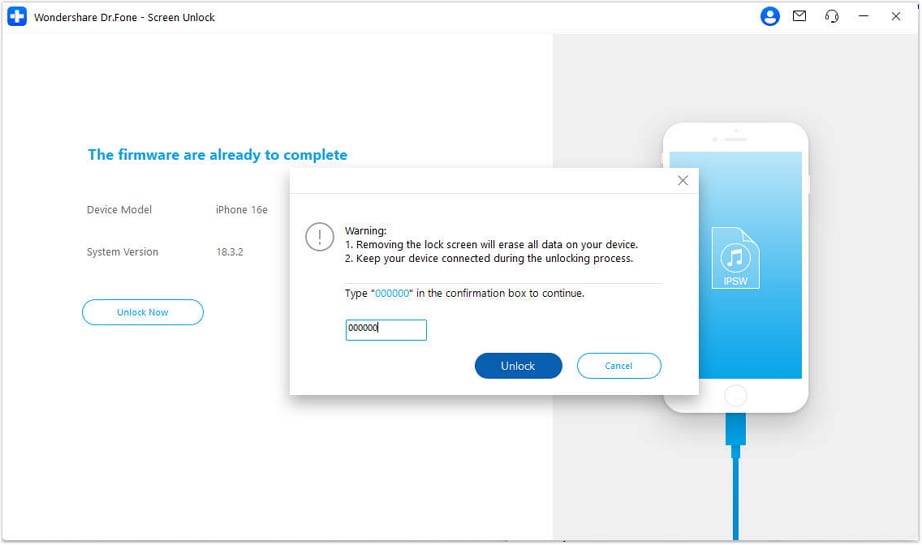
Conclusion
To summarize, resolving an iPhone asking for an Outlook password requires a systematic approach. From re-entering passwords to adjusting settings, this guide has covered 13 comprehensive fixes. For those facing the challenge of a locked iPhone, Dr.Fone offers a reliable solution. Users can ensure integration between their iPhones and Outlook by addressing these issues. This will enhance their overall email experience.
Tips: Are you searching for a powerful Screen Unlock tool? No worries as Dr.Fone is here to help you. Download it and start a seamless unlock experience!
How to Make the Most of Your Apple iPhone 14 Lock Screen with Notifications?
The Apple iPhone 14 lock screen has certainly changed a lot over the last few updates of iOS. Not only it provides an added security to the Apple iPhone 14 device, but with iPhone lock screen notifications, we can also save our time and efforts. With the introduction of iOS 18, we can also see a change in iPhone lock screen with notifications as well. To help you make the most out of lock screen notifications iPhone, we have come up with this ultimate guide. Read on and know all sorts of things you can do with iPhone notification lock screen.
Part 1: How to use iPhone lock screen notifications?
When it comes to iPhone lock screen with notifications, there are so many things that you can do. For instance, here are a handful of things you can do with iPhone lock screen notifications.
Reply to messages quickly
If you aren’t using this iPhone notification lock screen feature, then you are certainly missing out on something. You might already know that you can get a preview of messages on your home screen. Simply long press it (or 3D Touch) to interact with it. From here, you can reply to your messages without unlocking your device.
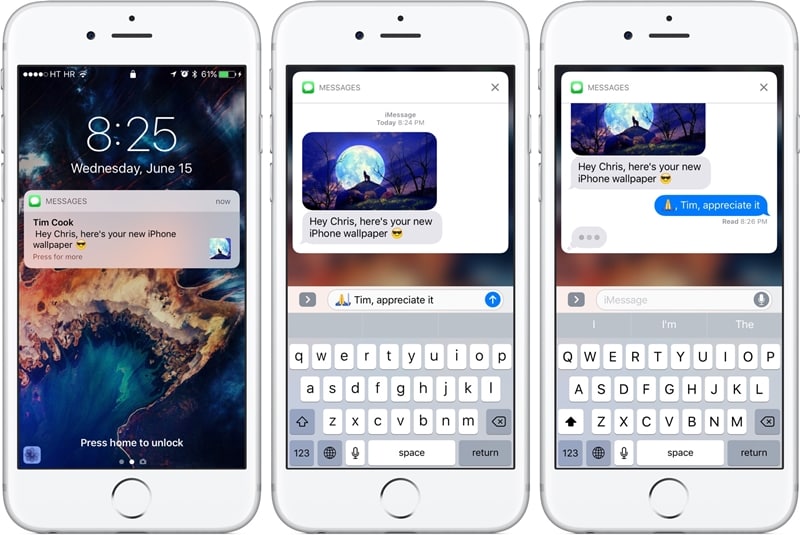
Interact with apps without unlocking your phone
Not just your messages, you can interact with other apps as well right from the lock screen notifications iPhone. After getting a list of notifications, you can simply tap on the “x” button to close them.
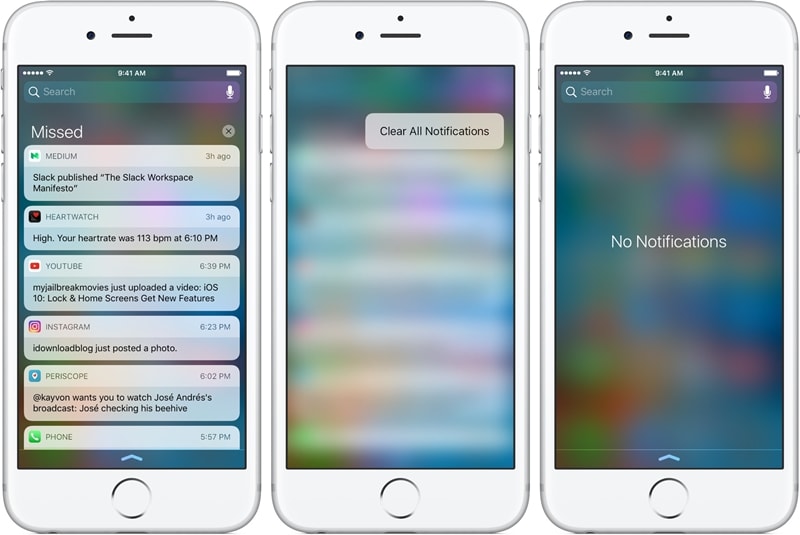
Though, if you want to know more, then just long press the notification. For instance, if you have got a notification for an email, then you can get various options just by long pressing it.
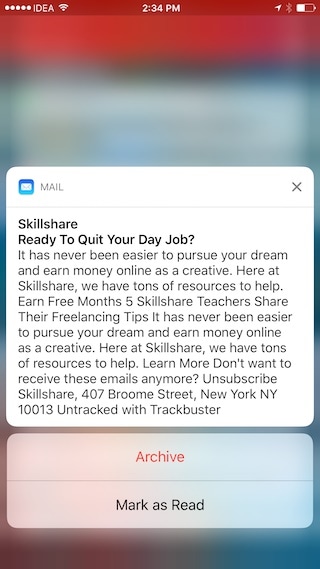
Search for anything
Besides interacting with widgets and apps, you can also search for something on your device and that too without unlocking it. Simply tap on the search bar to make it work.
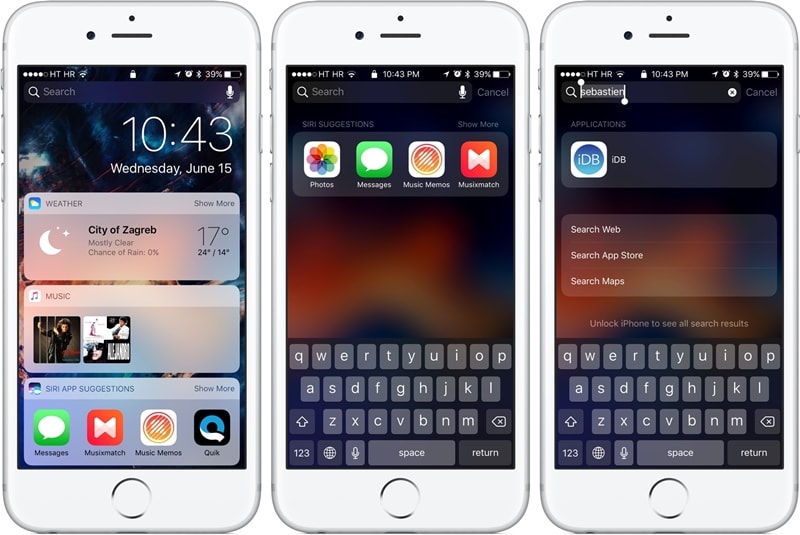
Part 2: How to turn off notifications on iPhone lock screen?
Sometimes, people can access our private information just by looking at our notifications. In this way, they can get read your crucial information and that too without unlocking your device. By simply visiting your device’s settings, you can customize iPhone lock screen with notifications. In this way, you can turn on or off iPhone lock screen notifications for the apps of your choice.
1. Unlock your device and go to its Settings > Notifications to access all the features related to its notifications.
2. From here, you can view a list of all the apps that can access notifications.
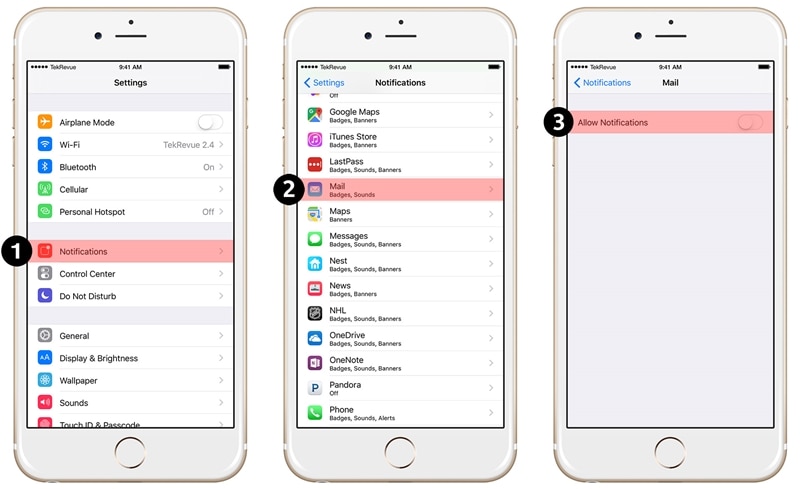
3. Simply tap on the app of your choice (Mail, Message, Photos, iTunes, etc).
4. From here, turn off the option of “Allow Notification” to completely turn off the notifications for the app.
5. If you simply want to turn off notifications on lock screen, then switch off the option of “Show on Lock Screen”.
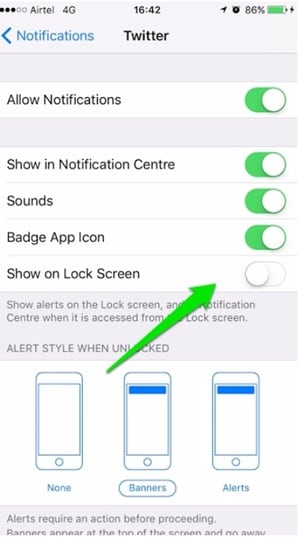
Besides that, there are a few other options as well that you can either enable or disable to customize your lock screen notifications iPhone.
Part 3: How to turn off notification view on iPhone lock screen?
The notification view can be used to see previous notifications on the Apple iPhone 14 device without unlocking it. Needless to say, most of the users don’t like to include this iPhone notification lock screen feature. To turn off the notification view of iPhone lock screen notifications, follow these steps:
1. Firstly, unlock your device and got to its Settings > Touch ID & Passcode option.
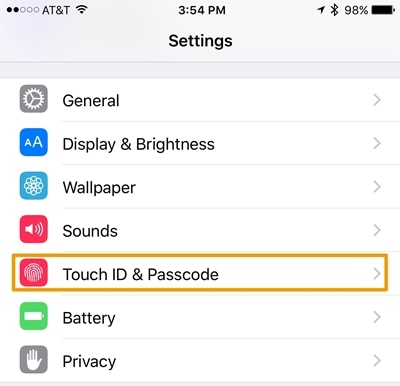
2. You would be needed to provide the passcode or your fingerprint in order to access these settings.
3. This will provide a list of features related to your passcode. Go to the section of “Allow Access When Locked”.

4. From here, make sure that the option of “Notification View” is turned off.
After turning the option off, you can exit from the Settings interface. In this way, your device won’t display the notification view.
Part 4: Changes on iPhone lock screen notifications on iOS 18
With the new update of iOS 18, we can see a drastic change in the Apple iPhone 14 lock screen notifications as well. Since the Apple iPhone 14 lock screen with notifications have been integrated into one, it becomes quite easier for users to access it.
Access iPhone notification lock screen on iOS 18
Some people find it a little tricky to access the lock screen notifications iPhone after the iOS 18 update. Instead of sliding the screen from the top, you need to swipe it from the middle. By swiping it from the bottom, you might get its control center.
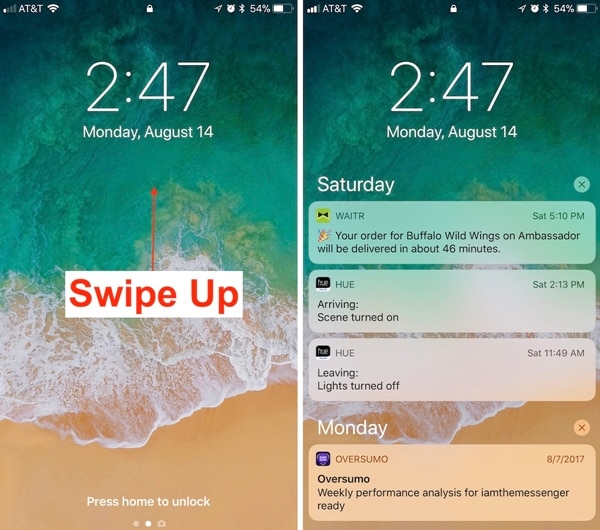
Simply swipe up from the middle of the screen to get a list of all the notifications. Now, you can slide them to access the old notifications.
Nevertheless, you can swipe from the top to access the cover sheet.
Swipe left or right
This is undoubtedly one of the most evident new features of the Apple iPhone 14 notification lock screen of iOS 18. Now, you can swipe left or right to access various features. By swiping left, you can access the Camera on your device and by swiping right, you can access your Today View.
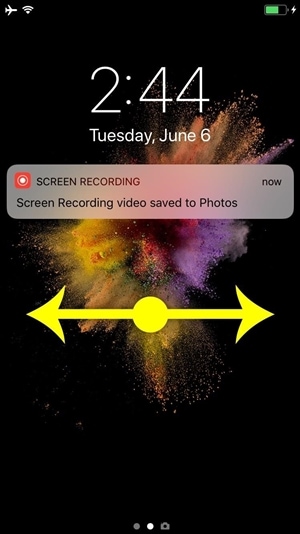
If you want to click pictures instantly, then simply swipe left the lock screen. This will launch the Camera on your device, letting you click pictures on the go. Similarly, by swiping right, you can access your Today View. This includes vital data from apps and widgets that your smartphone assumes is important for you regarding the day.
We hope that after following this guide, you would be able to gain in-depth information regarding iPhone lock screen with notifications. Apart from all the basic things you can do on the lock screen, we have also provided easy ways to customize it. Furthermore, there are so many things that you can do with the iOS 18 iPhone lock screen notifications. While most of the users loved the feature, some are quite hesitant about its application. What is your take on this? Let us know about it in the comments.
- Title: In 2024, 7 Ways to Lock Apps on Apple iPhone 14 and iPad Securely
- Author: Sophia
- Created at : 2024-03-30 19:48:54
- Updated at : 2024-04-01 14:24:15
- Link: https://ios-unlock.techidaily.com/in-2024-7-ways-to-lock-apps-on-apple-iphone-14-and-ipad-securely-by-drfone-ios/
- License: This work is licensed under CC BY-NC-SA 4.0.


